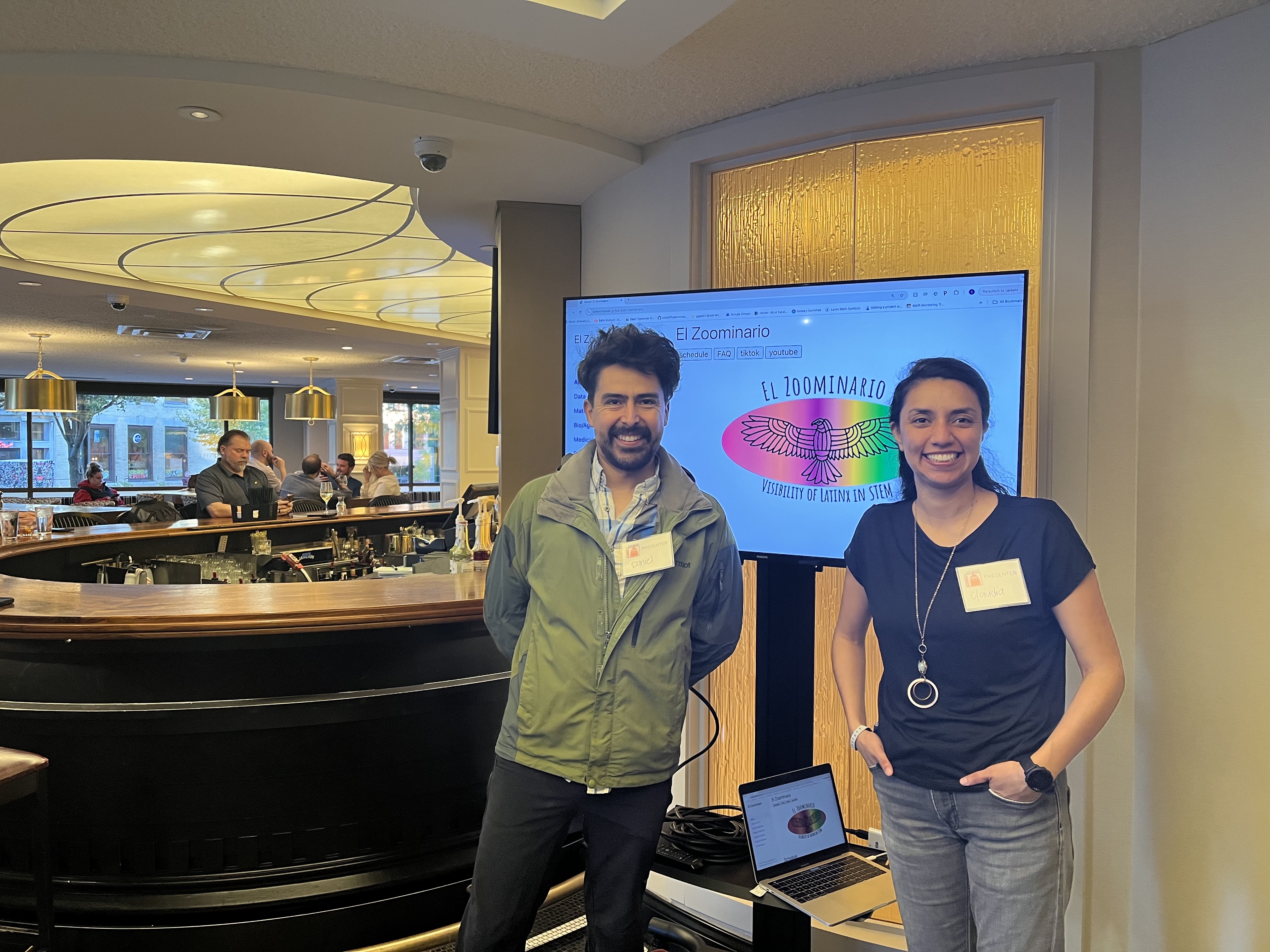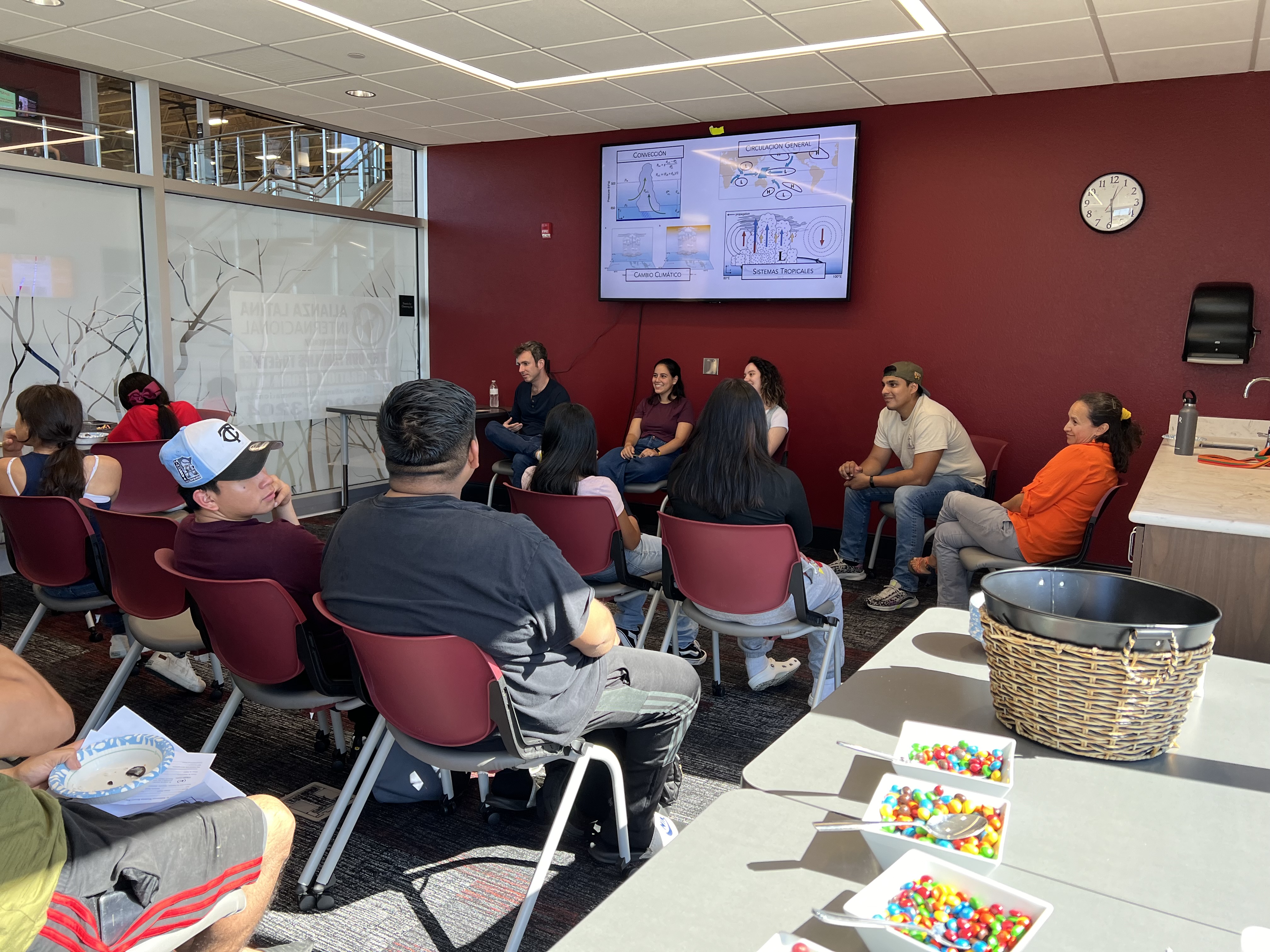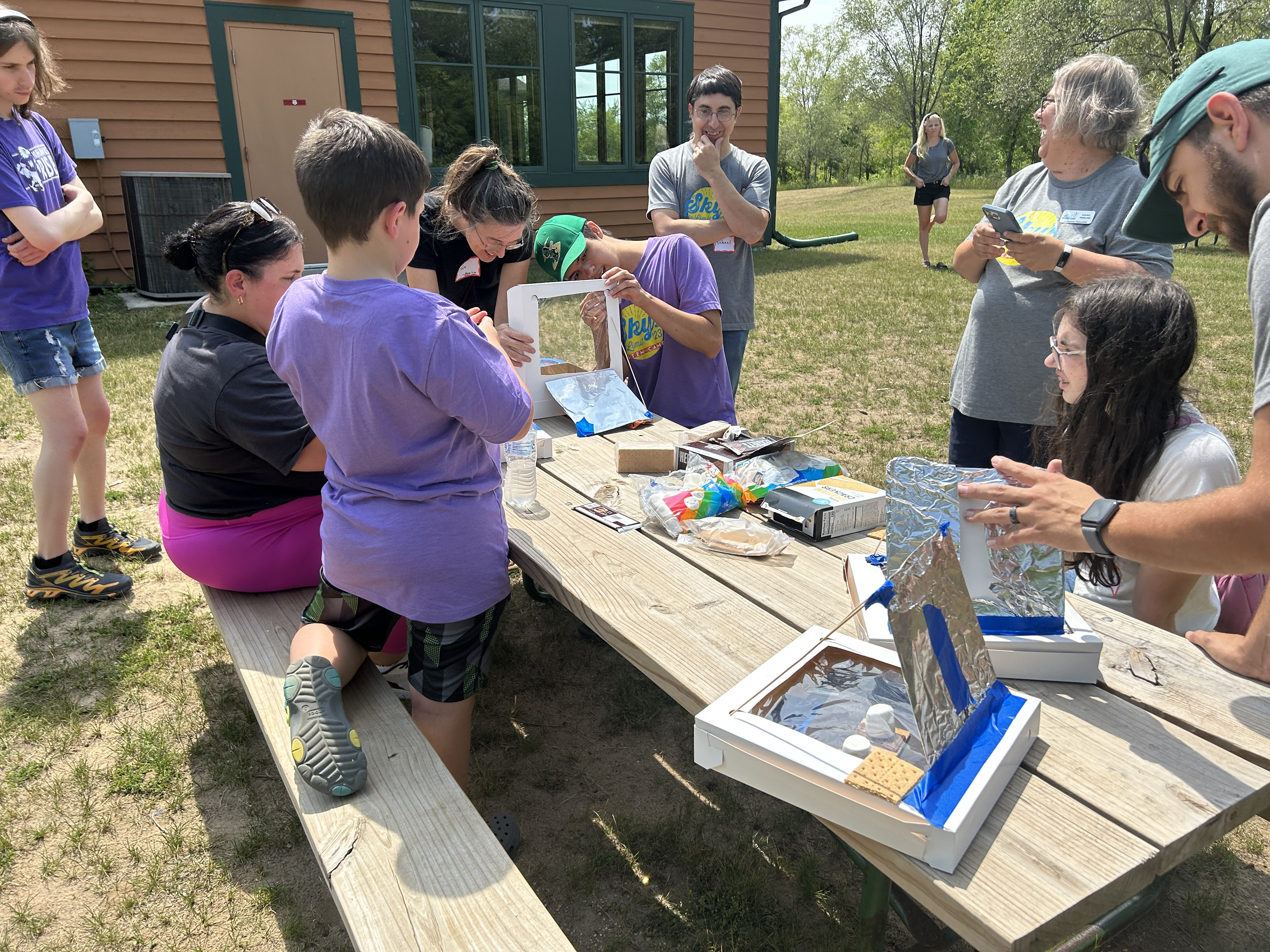Excellence in outreach recognized with Bassam Z. Shakhashiri Public Science Engagement Award
Plant pathology professor Claudia Solís-Lemus and climate scientist Michael Notaro have received the Bassam Z. Shakhashiri Public Science Engagement Award.
The award, in its third year, is named for Bassam Z. Shakhashiri, emeritus professor of chemistry and the William T. Evjue Distinguished Chair for the Wisconsin Idea, in honor of his “Science is Fun” philosophy and long-term commitment to science education and public engagement. The award recognizes one University of Wisconsin–Madison faculty and one academic staff member who have shown excellence in engaging the public in STEAM (Science, Technology, Engineering, Arts and Math) research.
“The selection committee has named Professor Claudia Solis-Lemus (faculty awardee) and Michael Notaro (academic staff awardee) the 2025 recipients of the Bassam Shakhashiri Public Engagement in Science Awards and I join in offering my congratulations,” says Shakhashiri. “Science and society have what is essentially a social contract that enables great intellectual achievements but comes with mutual expectations of benefiting the human condition and protecting our planet.”
“We must engage the public in meaningful conversations in and about science and technology,” Shakhashiri says. “Our research satisfies our curiosity, and we enjoy it. However, we have a responsibility to serve society. We must succeed in enabling people to make informed choices, be skeptical, reject shams, quackery, and unproven conjecture, and to avoid being bamboozled into making foolish decisions where matters of science and technology are concerned.”
This award is co-sponsored by the Office of the Vice Chancellor for Research, Wisconsin Alumni Research Foundation and the Morgridge Institute for Research.
“This year’s awardees are champions for elevating diverse voices in STEM by removing barriers to STEM education and connecting data science, climate science and art. In doing so, they are furthering the Wisconsin Idea and inspiring the next generation of researchers,” says Dorota Brzezinska, vice chancellor for research. “Claudia and Michael are celebrated with this award, especially for helping remove barriers to success in STEM for Latinx, neurodivergent and other marginalized communities.”
Claudia Solís-Lemus
Solís-Lemus, an affiliate with the Wisconsin Institute for Discovery, is originally from Mexico City where she completed undergraduate degrees in actuarial sciences and applied mathematics at the Autonomous Technological Institute of Mexico. After moving to Madison, she earned a master’s degree in mathematics and a Ph.D. in statistics at the UW–Madison.
Today, Solís-Lemus collaborates with life sciences researchers, developing mathematical models to help them understand relationships and interactions among species. She works with biologists to create complex networks, or trees, depicting the evolutionary processes connecting multiple species. She also studies how soil microbes affect plants and uses machine learning to pursue her long-term goals of predicting what kinds of plants might grow and thrive in different soils and how soil microbiomes might respond to environmental change. Her lab develops open-source software to support this work.
Outreach and service are central to Solís-Lemus’ work, and she has devoted her outreach efforts to increase Latinx representation in STEM, empower science and society through data science, and enhance science communication through art.
Solís-Lemus has introduced students to data science through her work on FastStats web apps for Wisconsin Fast Plants. To make statistical concepts more accessible to students at any stage, Solís-Lemus produced Data Science learning materials to accompany existing WI Fast Plants K12 educational programs. Further, she created the Latinx in Statistics database with the American Statistical Association to encourage networking and diverse speakers at academic events.

Solís-Lemus also co-created El Zoominario, a series of scientific short talks in English, accessible to general audiences, given by Latinx scientists for U.S. Latinx students.
Solís-Lemus also co-created El Zoominario, a series of scientific short talks in English, accessible to general audiences, given by Latinx scientists for U.S. Latinx students. El Zoominario aims to provide students in middle school and high school with role models in STEM among Latinx populations. In partnerships with middle and high schools in Wisconsin, El Zoominario is becoming an educational tool for generations of Latinx students.
The name “El Zoominario,” is a mix of Zoom and “seminario” (which means “seminar” in Spanish). These talks are shared live and publicly available on YouTube. El Zoominario Kids are shorter 5-min cartoon videos for younger audiences. El Zoominario now has a library of over 30 videos, which are advertised to middle and high school students in partnership with Wisconsin public schools.

In September 2024, Solis-Lemus co-organized a Latinx science speaker series for the public library in Arcadia, Wisconsin, which is 70% Latinx students.
Solís-Lemus has participated in the Wisconsin Science Festival every year since 2021 and other similar events such as the “Crossroads of Ideas,” “Uncontrolled Variables: Comedy Show about Science,” and “Sci-prov: Improv Show about Science.” In September 2024, Solis-Lemus co-organized a Latinx science speaker series for the public library in Arcadia, Wisconsin, which is 70% Latinx students.
In addition, she has been active in strengthening the comunidad latina on campus with events such as the “Celebrating Latinx Voices in STEM” symposium at WID in October 2023 and in October 2024, to be repeated annually.
As part of her efforts to enhance science communication through art, she co-created and directed an award-winning full-length zero-budget sci-fi movie (“There are no bugs in winter”) in which a computer scientist was represented by a Latina to combat racial stereotypes in science. In addition, in 2023, she co-organized the “Technical to Beautiful: Data as Art” exhibition on data from an artistic lens.
Solís-Lemus also teaches statistics beyond academic audiences such as workshops and lectures to help prosecutors and defense attorneys understand statistical evidence in the justice system. Since Spring 2022, Solís-Lemus has taught statistics to Wisconsin public defense attorneys, in the National Forensic College, and for the Los Angeles Innocence Project.
Michael Notaro
Notaro, who holds a Ph.D. in atmospheric sciences from the University at Albany, is Director of the Nelson Institute Center for Climatic Research (CCR) and has worked at CCR for more than 20 years. As a scientist III, he is the first academic staff member to hold the position of CCR director in its six-decade history.
Over those 20-plus years, Notaro has worked on a diverse set of research and outreach topics, including regional climate modeling in the Midwest and Great Lakes Basin in support of dynamically downscaled climate change projections; land-atmosphere interactions including vegetation feedbacks on global monsoons and lake-effect snow; climate change impacts on aquatic and terrestrial ecosystems and wildlife; Middle Eastern dust storms; and K-12 climate education.
He uses this robust academic background as the basis for public STEM outreach to community organizations, children, adults and teachers from a variety of backgrounds, tailoring it to their interests and learning styles.
 Notaro is widely respected for his extensive list of science outreach, children’s programs, STEM camps for diverse youth, and citizen-science teacher training workshops that he builds and runs each year.
Notaro is widely respected for his extensive list of science outreach, children’s programs, STEM camps for diverse youth, and citizen-science teacher training workshops that he builds and runs each year.
He is a Wisconsin GLOBE (Global Learning and Observations to Benefit the Environment) partner/trainer, working with K-12 schools to implement NASA’s hands-on, youth citizen science program. Using GLOBE protocols, Notaro runs a variety of camps and programs that teach students and their teachers how to collect natural science data and upload it to a long-running database. Children record information from their communities about temperature, vegetation cover, water clarity, and precipitation, and then compare this against data reported from their location going back decades. In this way, participants learn how scientists collect and analyze information, and can develop and implement locally-relevant research projects in their communities.
One such program is his National Science Foundation-funded WELCOME program, focused on the School District of Beloit, which aims to build STEM skills, remove barriers to STEM fields, and broaden geoscience opportunities for diverse youth. He also leads three GLOBE-inspired STEM camps aimed at fostering neurodiversity in science: The Sky’s the Limit camp in Beloit and Nature’s Navigators in the Wisconsin Dells offer specially tailored opportunities for autistic youth, and Beloit’s Muddy Waters STEMinist Camp empowers high school girls to investigate the many facets of STEM through the lens of water science.
Notaro is a sought-after speaker, including speaking to professional audiences such as the United Nations, about his work. He also teaches AOS 100 Weather and Climate through the Summer Collegiate Experience Program, a six-week program designed for incoming first-year undergraduates from first-generation and other underrepresented backgrounds..
“Science and technology are the engines that drive our economy and greatly contribute to the quality of life and to the well-being of society,” Shakhashiri says, “I call on everyone at UW-Madison to purposefully connect and share the value of our scholarly research and education work with the general public. We must connect locally and with communities in every corner of the State, and across the Nation.”
By Natasha Kassulke, natasha.kassulke@wisc.edu
